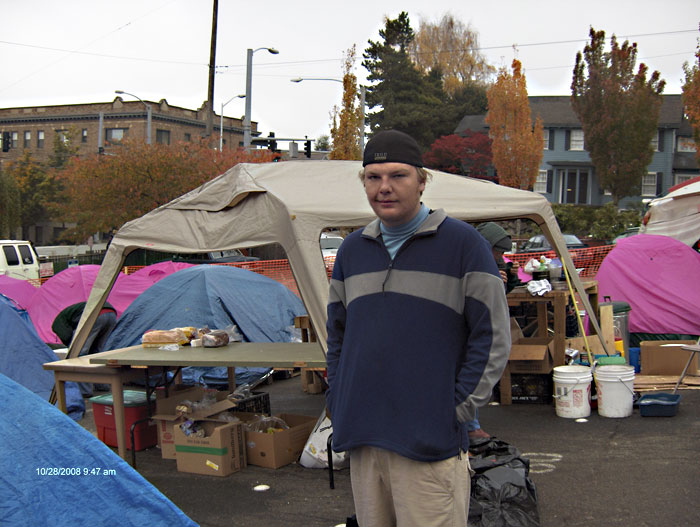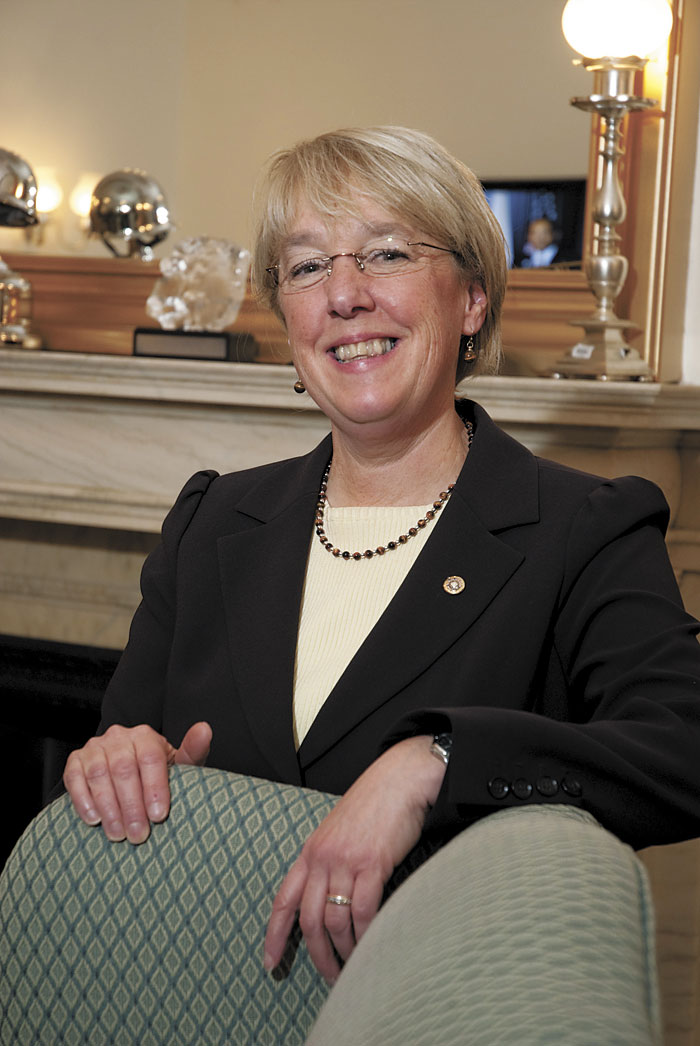Nickelsville, that collection of pink tents that cropped up overnight in September on vacant city property, is not the semi-permanent shantytown its organizers envisioned, having weathered three city-forced moves in its six weeks of existence. But it has accomplished something notable: It’s survived.
Contrary to what Mayor Greg Nickels recently said in an interview on the Seattle Channel, the people living there aren’t “homeless advocates.” The majority of Nickelsville residents are homeless, and had been living on the streets or camping elsewhere before coming to the tent city.
“It’s a place where people who are homeless can not only find shelter but community together. It’s a necessity,” says Alison Eisinger, executive director of the Seattle/King County Coalition on Homelessness. “I know providers, when forced to turn people away because they don’t have room, send them to Nickelsville. That says it all.”
Seattle city councilmember Nick Licata agrees, stating that, “If it wasn’t offering a solution, those tents would be empty. It is meeting some immediate need.”
In fact, the encampment, now located on the University Christian Church’s parking lot and more than 90 residents strong, has had to turn people away. Residents say their primary concern is shelter, and they are acutely aware that Nickels thinks their plight is just a protest.
“The mayor says everybody here has a home to go to; I don’t understand it,” says Nick Hoffner, 28, an Iraq War veteran who says he tried to make it as a chef before his money ran out. “I’ve slept on the doorsteps of churches and under bridges. I’ve slept in a lot of places. Here you don’t have to worry about people coming to kill you.”
“I don’t want to fight the mayor. I don’t care about him any more than he cares about me,” adds Aaron Beaucage, an out-of-work truck driver and former fisherman who was staying in a hotel on Aurora until he could no longer afford it. He’s lived in Nickelsville since it was in SoDo.
Though the deadlines imposed by the city for the camp to move have grown increasingly longer at each location (three days in SoDo, seven days in Discovery Park, three weeks in the U District), Nickels remains undeterred. The city is pressuring the church either to move the encampment inside or kick Nickelsville out. But the Nickelodeons are patient and hopeful that time is on their side. They’re still looking for a place to build that shantytown.
Nickelsville has evolved from its early days, when there were no rules or leadership structure. That changed about a week after its inception, when alcohol increasingly became a problem and a man was seriously injured after setting his tent on fire one night while burning candles. Open flames or smoking in tents were subsequently banned, as were liquor, drugs, and weapons. Other rules followed, including no violence, no begging, and no visitors between 9 p.m. and 7 a.m.
Nickelsville then created a process for removing anyone who breaks the rules. It includes an arbitration group to help mediate disputes and a “show-of-force team” to make sure that those who are kicked out stay out. All told, it appears the Nickelodeons are successful in policing themselves. Though a couple dozen people have been kicked out of the encampment for not following the rules, the Seattle Police Department says it’s only had to respond to one incident, in which a 42-year-old male was booked for unlawful use of weapons after he pulled nunchucks on a fellow Nickelodeon last month.
“I’m not seeing Nickelsville being a place of chaos,” says Licata. “It sounds like it’s well-ordered.”
“They’ve been really easy to work with,” adds University Christian Pastor Janetta Cravens Boyd. “They’ve been good neighbors.”
For the first few weeks, Nickels chased Nickelsville off city and state property by threatening fines for being an illegal use of land, but the game has changed now that the encampment has landed at a church. Religious organizations have protection under a federal law that allows them to carry out their mission on their property as they see fit. This law has been tested at churches in cities surrounding Seattle that wished to host tent cities and were taken to court by the neighbors. The churches so far have prevailed.
Seattle, however, didn’t challenge church rights under the Religious Land Use and Institutionalized Persons Act, opting instead to sign a consent decree with tent city operator SHARE/WHEEL in 2002 that allows one encampment within the Seattle city limits at a time. Nickels argues that because there’s currently a tent city in Haller Lake, SHARE/WHEEL—and by extension, Nickelsville—is in violation of that agreement. But SHARE maintains it’s separate from Nickelsville, despite the fact that SHARE founder Scott Morrow had a hand in organizing Nickelsville.
SHARE attorney Sean Russel argues that Morrow is no longer an employee of the organization. (Morrow will not speak for the record.) Russel adds that any other people affiliated with SHARE who have been helping out with Nickelsville are doing so on their own time. “These are concerned citizens, the same as you and I participating in something because we believe in it,” says Russel.
“The reality is that there’s not a lot Seattle can do,” says Bill Kirlin-Hackett, director of the Interfaith Task Force on Homelessness. “There’s really no further escalation it can take, now that they’re in a church parking lot. What contributed to a sense of calm in the church is that they know this is their mission.”
“We’re not responding to the political nature of this situation,” adds Cravens Boyd. “We’re responding to the needs of the homeless population. Our concern is that they have adequate shelter. We’d like to work with the city on that.”
But last week the city denied the church’s request for Nickelsville to stay another month, and began Nov. 1 to fine University Christian Church for operating an illegal encampment. The church applied for a temporary-use permit so the camp can remain, and if necessary could fight the city under the RLUIPA.
“We feel that asking the encampment to move again really further disrupts the community, disrupts the lives that are already vulnerable of the men and women who are homeless,” says Cravens Boyd. “It doesn’t resolve the issue. We’d like for them to be able to stay at least a little while longer.”
While it is a collection of tents, Nickelsville is different from other tent cities in some notable ways. First, the governance structure at SHARE is formal and centralized, whereas Nickelsville, though it has created some rules, is trying to keep power in the hands of many. For example, the entire camp meets nightly at 6 p.m. to discuss internal and external issues, and membership on the show-of-force and arbitration teams rotates among residents.
Also, unlike the SHARE tent cities, Nickelsville welcomes families with children, and has no restrictions on men and women sleeping in the same tent. (The tent cities allow couples, but don’t let single people host guests of the opposite sex.) Nickelsville’s looser rules have attracted some teenagers.
[This story has been corrected to reflect the fact that SHARE’s tent cities allow couples.]
However, notably absent from Nickelsville are its original organizers. Most of them came from SHARE’s tent cities, and most of them, like Craig Corey, went back after setting up the original encampment before dawn on September 23.
“I put my effort into planning for the people who need it: the victims of [Nickels’] sweeps,” Corey says while puffing on a cigarette in the common area at Tent City 4, now located on Mercer Island. He’s disappointed, however, with the restrictions Nickelsville has adopted, namely the no-drinking rule. “It’s becoming some sort of white-bread experiment,” he adds.
Nickelsville’s goal, as stated on a white sheet of butcher paper hanging on the wall at the Josephinum where organizers still meet weekly, remains what it was five months ago: “Housing for up to 1,000 homeless men, women and children with structures and services.”
“Their original intention was to be something other than another tent city, so my sense is that there’s a small amount of frustration for folks who were hoping they’d create something different,” says Kirlin-Hackett.
But Corey says he for one isn’t disheartened that Nickelsville is just another tent city. “[The shantytown] was the ultimate goal, but no one thought we’d get that right off the bat,” he concedes. “That’s in the category of a pipe dream.”
Nickelsville residents are still hopeful that they’ll mimic the success of Portland’s Dignity Village, which began as a tent city in late 2000 and moved around for nearly a year before convincing the city to provide surplus property on which to build. Today, Dignity Village, which includes wood housing structures, a shared kitchen, and solar-powered showers, is home to 60 people.
Leo Rhodes, one of the only original Nickelodeons still living at Nickelsville, explains that it’s all part of the process of trying something new. “It’s getting there, yeah—it’s just going to take a while,” he says. “Just like any other thing, [Nickelsville] has got to find its way.”
Real Change Executive Director Tim Harris calls Nickelsville a “fabulous success,” in large part because “it’s still there.” Still, he’s skeptical that they’ll ever be able to build a Dignity Village–like settlement.
“At least not under this mayor,” Harris says. “He’s really dug in. He’s really inflexible. But it’s not a given that he’ll win the next term.”






